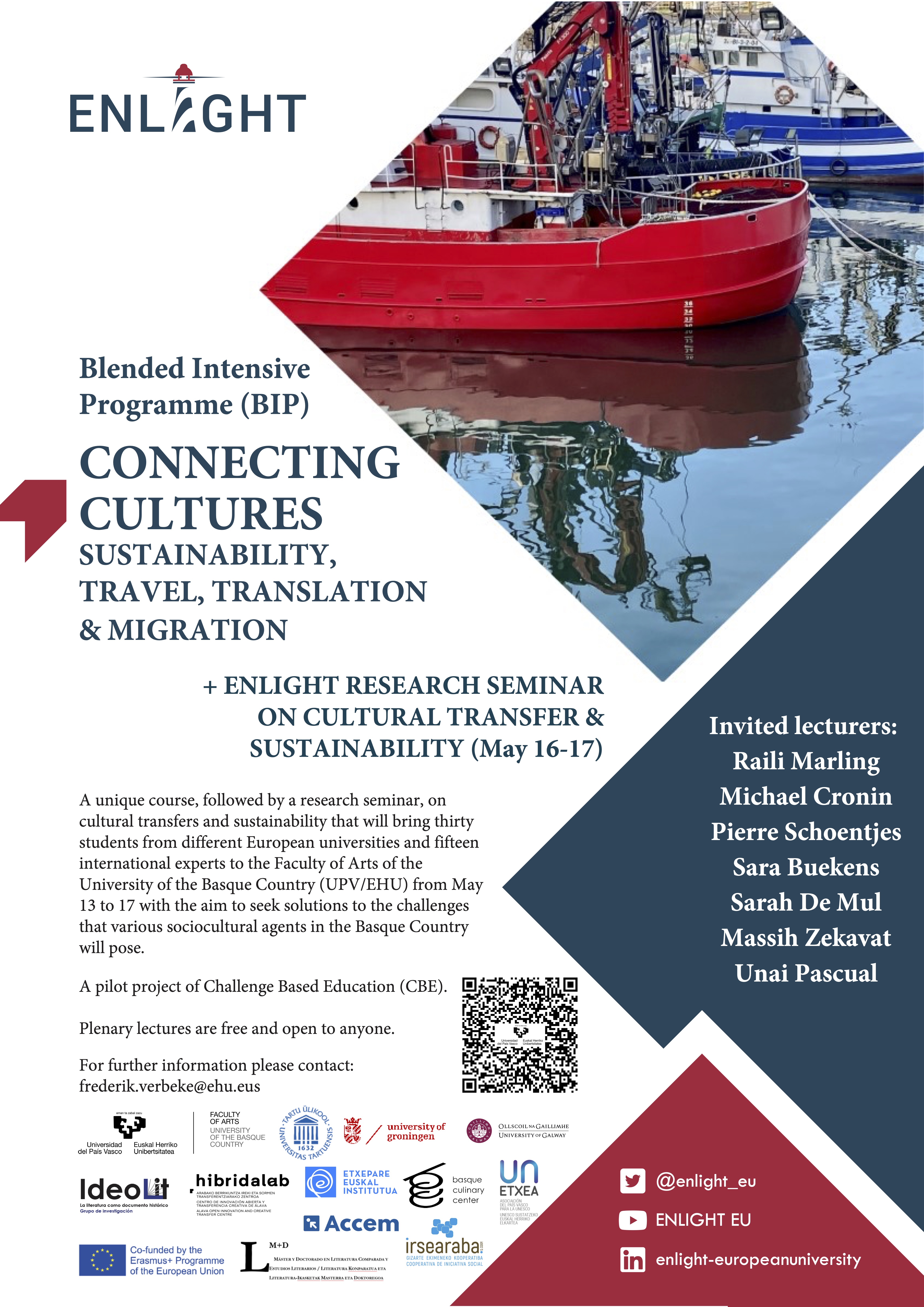
A unique course, followed by a research seminar, on cultural transfer and sustainability will bring to the Faculty of Arts of the University of the Basque Country (UPV/EHU) in May 2024 about thirty students from different European universities and fifteen international experts with the aim of finding solutions to the challenges that various sociocultural agents in the Basque Country will pose to them. It is also a pilot project of pedagogical innovation for the implementation of Challenge Based Education.
The “Connecting Cultures: Sustainability, Travel, Translation & Migration” course is a Blended Intensive Programme (BIP) of ENLIGHT, the European university that groups the UPV/EHU with nine other universities (Galway, Uppsala, Gent, Groningen, Göttingen, Bratislava, Tartu, Bordeaux, Bern). A first part of the course is done online during the months of March and April and the second is done on site for a week in mid-May at the Faculty of Arts, in Vitoria-Gasteiz.
In an increasingly interconnected and globalized world, understanding the ways in which cultures interact, influence and transform each other is crucial to fostering sustainable and inclusive societies. The course will address the challenges and opportunities presented by cultural encounters and exchanges from different angles. The complexities of cultural interactions and their implications for sustainability will be analyzed.
About thirty master's and doctoral students will participate in the course, representing an impressive linguistic and cultural diversity. In fact, they come from the universities of Galway, Tartu, Uppsala, Gent, Bratislava, Groningen and the UPV/EHU, but their cultural ties are not limited to Ireland, Sweden, Belgium, the Basque Country, Estonia and Slovakia, they extend much further: Iran, Indonesia, New Zealand, Colombia, Serbia, Italy, Germany, Ukraine, Azerbaijan, United States, etc. A linguistic diversity that will be given visibility following the linguistic policy that was designed for the Ocean i3 cross-border project of the Euskampus-Bordeaux campus.
During the online phase, students will start from the general idea of the course (cultural transfers and sustainability) to determine different essential questions and define the great challenges they want to address taking into account their personal and academic interests. In each online session they will continue to investigate and debate these challenges, transferring knowledge and experiences from their own cultures, and interacting with the topics raised in the lectures given by the course staff.
Professors Petra Broomans and Jeanette den Toonder (University of Groningen) will present a theoretical framework on forms of travel writing, eco-literature and the role of the author as a cultural transmitter in creating awareness about climate change. In her lecture “Sites of Encounter/Sites of Translation”, Professor Anne O’Connor (University of Galway) will talk about intercultural communication and landscape. Professor Luc van Doorslaer (University of Tartu) will invite you to discuss “Translation as interlingual, intercultural and intersemiotic transfer: illustrated by national and cultural image-building in travel writing”. Closing the online phase, the academic coordinator of the course, Professor Frederik Verbeke (UPV/EHU), will talk to you about “Migrants, refugees and minorities as agents of cultural transfer: ethical dilemmas and alternative narratives”.
During the on-site week, from May 13 to 17, several sociocultural agents from the Basque Country, representatives of associations, NGOs or cultural institutions such as the UNESCO Etxea or the Etxepare Euskal Institutua, will participate in the course. In a workshop designed and animated by Hibridalab, Alava Open Innovation and Creative Transfer Center, the agents will propose the specific contexts in which the groups, made up of students and teachers, will have to design concrete actions to respond to the challenges posed.
At the end of the week, teachers and students will give their feedback of the course, first together, and then separately. Each student will write a report where they reflect, among other things, on the learning experience, group dynamics, the impact of the course both academically and personally, and the cultural transfers that have occurred during the face-to-face week. The teaching staff, for their part, will participate in a networking session to design future collaborative initiatives within the framework of ENLIGHT, both at the teaching and research levels.
This BIP course seeks to put Challenge Based Education (CBE) into practice, a pedagogical model that both ENLIGHT and the UPV/EHU promote. For this reason, the course has the support of the Vice-Rector's Office for Undergraduate Studies and Educational Innovation and the Educational Advisory Service (SAE-HELAZ) and, in particular, the newly created Living Lab CBE i3lab, whose objective is precisely to focus on CBE methodology in a coherent manner and aligned with the ENLIGHT project. Through the Living Lab, the implementation of the CBE in this course will be monitored and the experience will be shared in international forums.
In addition, the DREAM research group (Donostia Research Group on Education and Multilingualism), in collaboration with Euskampus, will carry out action research on the multilingual and multicultural reality of the group, collecting data on the linguistic practices and the linguistic landscape that will be produced during the course, in order to recommend tools and good practices for the use of various languages, thus contributing to awareness of cultural and linguistic diversity.
Both the course and the research seminar also have the support of the European Commission (Erasmus+), ENLIGHT, Vice-rectorate for International Relations, Faculty of Arts, Department of Philology and History, IdeoLit research group, Master and Doctoral Program in Literature Comparative and Literary Studies, and Euskampus Foundation.
For more information, you can contact the academic coordinator of the course, Professor Frederik Verbeke: frederik.verbeke@ehu.eus.
Documents:
